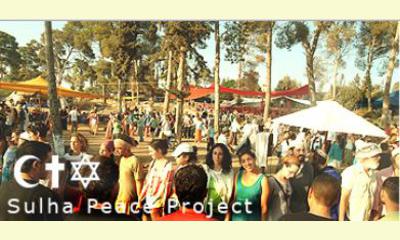|
|
Sulha Proyecto de Paz. Un método alternativo de resolución de conflictos
un articulo por Pablo Pejlatowicz (traducción para CPNN por Virginia Vilches Such]
Basado en un ancestral mecanismo de resolución de
conflictos comunitario, un grupo de palestinos e
israelíes han creado una iniciativa que cada mes
reúne a participantes de ambas comunidades para
que puedan expresar libremente sus sentimientos y
opiniones sobre asuntos humanitarios esenciales.

click on photo to enlarge
Desde 2001, el Proyecto de Paz Sulha ha creado un
espacio donde cada mes más de 100 jóvenes, mujeres
y hombres de Israel y Palestina se reúnen
alrededor de una hoguera tribal, comparten el
almuerzo, bailan, cantan y comparten su visión
sobre las posibilidades del futuro.
Estos vínculos humanos de pequeños grupos nacen en
una región dónde las diferencias culturales y
religiosas han provocado derramamientos de sangre
y dolor. Así se muestra como la cultura de paz
puede ser promovida en todas las comunidades con
un esfuerzo mínimo.
Como el Proyecto de Paz Sulha dice en su página: “en
contra de la actual atmósfera de desconfianza,
cinismo y desesperación, nosotros nos levantamos por
la posibilidad de cooperación, responsabilidad
compartida y esperanza.”
Ellos también han manifestado que “ mientras que
nuestras sociedades demonizan a los del otro lado,
nosotros los humanizamos. A través de nuestros
esfuerzos conjuntos, creamos interacciones entre
nuestras gentes mientras otros los enemistan.
Nosotros evitamos polarizar las declaraciones
políticas, sabemos que todo futuro político
abarcar los derechos humanos de ambos lados, así
que nosotros defendemos la vuelta de la decencia y
la compasión a nuestra tierra compartida.
Si quieres experimentar en primera persona la
Hoguera Tribal de Israel o el West Bank, puedes
asistir a “Sulha” o “Sulhita” para jóvenes, y
contactar Nibal en el 054-3257561 o escribir a
contact.sulha@gmail.com.
Más información en www.sulha.com.
( Clickear aquí para la version inglês)
|








|
DISCUSSION
Pregunta(s) relacionada(s) al artículo :
Is there a renewed movement of solidarity by the new generation?,
* * * * *
Comentario más reciente:
from Javier Collado Ruano, Director of Edition at Global Education Magazine, on the occasion of the International Day of Solidarity.
Solidarity is a trans-dimensional phenomenon that goes beyond the ontological essence of human nature. In fact, when we analyze the connections between the microcosm and the macrocosm, we perceive that human beings are not involved in chaos and arbitrariness, but belongs to the large network of interdependencies, complementarities and reciprocities that constitute life. The emergence of life on Earth, around 3,8 billion years ago, was a complex process of exceptional natural phenomena, inherent in all living systems. A process which is expressed through unlimited creativity: mutation, gene exchange, and symbiosis. From a cosmo-biological perspective, we can understand a new conceptual dimension of life, where all living beings share same basis of genetic code: the twenty amino-acids and four phosphatic bases. In fact, the diversity of living beings is caused by the combination of this cosmo-bio-genetic basis.
This trans-dimensional perspective has a deep ecological and spiritual sense for our worldview because the human evolutionary adventure is the latest stage of life on Earth. The modern human being is a vertebrate animal, mammal, belonging to the primates, which emerged 200,000 years ago. In recent centuries he has imposed its anthropocentric, industrial and capitalist vision to the detriment of Pachamama (and Indigenous goddess known as earth mother). We consume around 120% of the natural resources that Earth Mother regenerats annually. Our consumer behavior is immersed in a fatalistic dynamic with a destiny to climate change (deforestation, loss of biodiversity, ozone, etc.), and our own self-destruction as a species.
There is an urgent need to get beyond the cognitive fallacy that the mental structures of social Darwinism and capitalist postulates of the 19th century have historically constituted, because they only understand natural and social systems as warmongers and competitive processes whereby species diverge from each other. . ... continuación.

|
|









